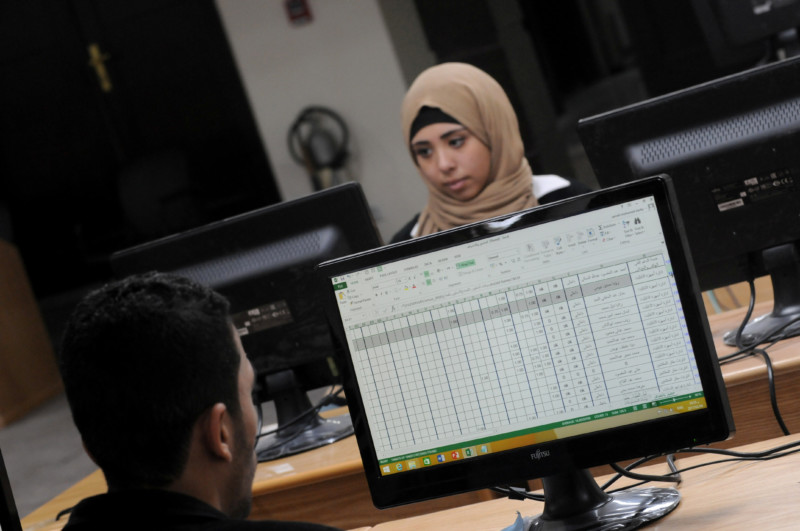Not All Data Is Created Equal
Data drives policy, and policy drives change. The impact of this policy, however, hinges on the quality of the data.

Employees work in front of a computer screen at the headquarters of Central Agency for Public Mobilization and Statistics (CAPMAS) in the capital of Cairo, Feb. 5, 2017. Shokry Hussien/Reuters
In a crisis, some always lose out more than others, and in the case of the COVID-19 pandemic, existing inequalities are widening. Women are disproportionately affected by the social and economic burden of the pandemic. Some 17.4 percent of the world population live in Africa, yet less than 3 percent of COVID-19 vaccine doses have been administered on the continent. As of September, schools have remained fully or partially closed in 27 percent of countries worldwide, leading to, in some cases, increased exposure to abuse and violence, drop outs, and child labor and marriage.
To successfully build resilience to these crises, rigorous data is critical to generate valuable information for real-time decision-making. Currently, however, the state of descriptive data is dismal; for example, only 46 percent of countries tracked by The Sex, Gender, and COVID-19 Project reported sex-disaggregated data for cases and/or deaths in the month of October.
Data was the buzzword of the Abdul Latif Jameel Poverty Action Lab Middle East and North Africa (J-PAL MENA) “Towards an Evidence-informed Development Agenda for Egypt” seminar. Held in partnership with UNICEF Egypt, the roundtable and panel collectively aimed to highlight policy priorities and knowledge gaps in Egypt where evidence can help strengthen the decision-making process. A part of the Egypt Spotlight Seminar Series, established in 2019, the dialogue aims to promote the use of evidence to design and implement effective solutions in the areas of social protection, gender, youth unemployment, education, health, and climate change. The discussion featured representatives from government ministries, non-governmental organizations (NGOs), and academica, all at the forefront of setting and implementing development policy in Egypt.
Prove It: Evidence-based Policymaking
Evidence-based policymaking—a three-step process involving conducting research, policy outreach activities, and capacity building—aims to set, and then achieve, government policy priorities. As times evolve rapidly, evidence, and the policy it informs, must develop alongside it, Jeremy Hopkins, UNICEF representative in Egypt, noted.
This evidence comes in the form of data—and lots of it. “If you ask me as an economist, what is the thing that I love and adore and hope we have more of, it’s data. It’s the basic, principle tool that we operate with,” Dr. Samer Atallah, Associate Dean of the AUC School of Business, said.
Minister of Social Solidarity, H.E. Dr. Nevine El-Kabbag, holds evidence-based policymaking “close to her heart”. The Ministry of Social Solidarity incorporates evidence into many aspects of policy making, from agenda setting to formulation to implementation, she said. There is a special emphasis on impact evaluation “to measure exactly the real changes that happen in the lives of people.” One such evaluation has already been conducted on the national food program.
Amid the COVID-19 pandemic, which has widened existing inequalities, comprehensive data collection and use has never been more important. Good data is disaggregated, useful, and accessible. Dr. El-Kabbag suggested a unique development strategy on data and statistics for Egypt, with an emphasis on disaggregation.
Disaggregated data groups raw data into explanatory categories based on identifying characteristics, such as gender, income, geographical location, and age. Successful disaggregation of data exposes hidden trends and enables the identification of at-risk groups, improving their visibility in the eyes of policymakers. Data disaggregation by sex, age, ethnicity and race, disability, and wealth is vital to understanding the differential impacts of shocks, like a pandemic.
Use It or Lose It
To be useful, data must be focused, cost-effective, and at the heart of policy needs.
At the Heart of Policy Needs
The key to determining what kind of data is needed and the corresponding methodology is partnerships, said keynote speaker Rema Hanna, Jeffrey Cheah Professor of Southeast Asia Studies at Harvard University. To pinpoint research priorities, studies need to be responsive to what governments need; this is why close collaboration is important “in order to optimally use the pieces of research that are produced to reach the policymakers, as much as to achieve the results expected,” Dr. El-Kabbag emphasized.
“It is very key that these partnerships are done with governments. If you want to do things at scale, governments are covering entire countries; governments have the resources and the power to run these kinds of programs,” Hanna added.
Focused
Once priorities are established, collaborators can decide between two types of evaluations: a new evaluation specific to a given context, program, or policy or one which draws knowledge from existing evidence. Hanna emphasized the ability of focused research, as a product of partnership, in producing optimal policy. “It shows the power of doing research to understand what can work and what cannot,” she said. Evaluations—often in the form of randomized control trials—can mark the difference between “parachute” project visualization and the reality on the ground, providing policymakers with a broader set of policy tools that are more effective at reaching people in need.
Cost-effective
However, programmers and policymakers often do not regard research as a priority; it’s a luxury, noted Nahla Abdel-Tawab, director of the Population Council’s Egypt office, adding that a randomized control trial can often cost over $1 million. Policymakers will skip research in favor of immediate implementation, requiring each approved evaluation to be as cost-effective as possible. Researchers also have a responsibility to develop rapid evaluation procedures, as policymakers often cannot wait for extensive research, especially when responding to shocks, Abdel-Tawab added.
Applying data to as many projects as possible can increase cost-effectiveness, Praveen Agrawal, Country Director Egypt at the World Food Programme, added. “One element, when we’re collecting data, is not to lose sight of the interdependence of data…we’re looking at the interdependence and the coherence of the data that’s being collected so that it can serve multiple purposes and address and build the linkages that are required,” he said.
Good data, however, is always useful. “If we’re looking at human capital development, then we’re looking at an investment, and that’s not short-term. That’s long-term,” Agrawal argued.
Logging In: Data Accessibility
Numerous factors determine data accessibility, namely: the digital divide, stakeholder participation, and the research environment.
Conquering the Divide
The digital divide separates the internet haves from the have nots, occurring when individuals suffer a lack of access to high-speed internet and/or access to reliable devices. According to the United Nations, 3.7 billion people—a majority of them women in developing countries—are still offline. Egypt’s data needs to be faster and more agile so more people can work with it, Agrawal argued. “[Digitalization] needs to have a user at the end of the day,” he added. It is critical that we ensure we are not leaving the poorest behind in the digital divide, Hopkins emphasized. Digitization might also offer a potential opportunity to change the nature of work for women in Egypt, Atallah added.
Stakeholder participation
A divide also emerges between the well-educated youth and older generations. “We need to bridge the gap also between us and them,” Dr. El-Kabbag stated. With Egypt on the verge of a demographic dividend—when a country’s working age population outpaces the non-working population, driving substantial economic growth—Hopkins also noted the importance of youth engagement, especially on climate change.
Stakeholders must be included in data collection to ensure accurate results. “Electronic data is not enough, we need to have some sort of field evidence, so I think collaboration between the electronic and the field and cross-checking, including communities with us in cross-checking the data is very important,” Dr. El-Kabbag added.
Research Environment
While research environments are multifaceted and can be unpredictable, freedom, transparency, and timeliness should take precedence.
Freedom of research is critical to effective policy outcomes. Egypt faces a lack of expertise when working with impact evaluations, Reham Rizk, the head of the Modeling and Forecasting unit at the Ministry of Planning and Economic Development stated. However, a representative from Save the Children International argued that the challenge was not a lack of expertise but a lack of an enabling environment in which to conduct research. Unimpeded research is also, by necessity, transparent and timely.
At Home and Abroad
At a “vital moment” for revisualizing social protection in Egypt, rigorous data is essential in implementing effective policy and measuring the success of policy already underway. “Egypt still has a lot to learn from other countries,” Hanna said. However, the country has a wealth of knowledge to share to help other countries design their own programs, she added. Sharing this knowledge, in the pursuit of more comprehensive data, is the first step to better policy.



